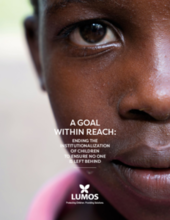Demographic Data
|
Sources: World Bank, UNDP, UNAIDS, DHS 2013 |
Displaying 5661 - 5670 of 14395
This series—which begins with a focus on schools— exposes the harm of punishing parents instead of addressing the root causes of child welfare involvement in the U.S.
This video from PBS News Hour features an interview with Dr. Alan Shapiro, a clinical professor in pediatrics at the Albert Einstein College of Medicine and co-founder of Terra Firma, who discusses the emotional and physical harms of detention on migrant children in the US.
This report from Lumos defines the global problem of institutionalization of children - including the factors that drive it and the harmful impacts it has on children's physical and cognitive development - and proposes global solutions in line with the Sustainable Development Goals.
The International Society for the Prevention of Child Abuse and Neglect (ISPCAN), in partnership with the Oman Ministry of Social Development, Children First Association, Sultan Qaboos University, United Nation’s Children’s Fund (UNICEF), and the ARAB-CAN Society, proudly present the 2019 ISPCAN Congress in Oman.
Taking place from 15 - 17 September 2019, this international conference will attract participants from many disciplines, sectors, and parts of the world who all share a passion for what the science and practice of implementation offers in making real change and improvement to people’s lives and services.
This article presents the perspectives of three authors - who have collective experience in administration, practice, and research in both systems - on the interaction between the adult corrections system and the child welfare system in the USA and the implications of this interaction for children with incarcerated parents.
This study addressed foundling and abandoned children in the Palestinian society as a multi-dimensional phenomenon.
This chapter argues that poverty per se should never constitute the basis for removing children from their parents and seeks to understand the British situation, in order to see how poverty is treated in relation to child welfare in Britain.
The objective of this study was to compare the outcomes for the Neuro-Physiological Psychotherapy (NPP) intervention group to those of a control group.
The aim of this study was to document the health needs of Aboriginal and Torres Strait Islander children and adolescents in OOHC attending the paediatric service at the Victorian Aboriginal Health Service (VAHS) between February 2014 and February 2016.

